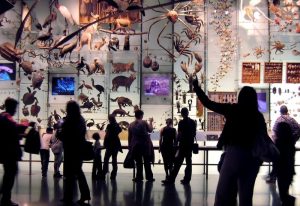summit
Philanthropy for the Future: Civic Science, Data Sharing, and Community Voice

Rapid technological and scientific breakthroughs have made extraordinary advances, but as we’ve seen with the rollout of the COVID-19 vaccine, not all solutions work for all communities, where priorities, beliefs, expertise, and resources vary widely.
As philanthropy seeks the most effective levers to drive social innovation, evidence and experience point to the need for approaches that ensure solutions fully serve the needs of the communities most impacted. The complexity of today’s challenges calls for leaders and networks with new ideas, new mindsets, and far greater participation.
This kind of community—anchored in cross-collaboration and shared learning—is more important than ever, as we look to build philanthropic approaches that can meet today’s challenges and opportunities for transformative change. As a public square for philanthropy, Stanford PACS and the Philanthropy Innovation Summit are bringing funders together around the excitement for the work ahead and the innovative ways philanthropy can be a catalyst for change.
One such approach that’s building momentum among funders is civic science, a concept that prioritizes meaningful collaboration between scientists conducting research and the people whose lives could be impacted by it. In 2020, a new initiative—the Civic Science Fellows program—emerged to test civic science approaches to connecting science and society. Viewed as a research and development lab in which cross-sector experimentation and models of inclusion and harm reduction are the norm, the program brings diverse leaders and projects together, building meaningful collaborations as a result.
One particularly exciting result of this new lab is the Dark Patterns Tip Line (DPTL), a public resource that engages and encourages people to submit their stories about misleading tactics used in websites and apps to deceive people into actions that violate their interests, like consenting to hidden fees and sharing personal information. Created by Stephanie Nguyen while she was a Civic Science Fellow hosted by Consumer Reports, the online reporting tool is tracing these dark patterns with an equity lens and showing the way toward design approaches and policy solutions that can benefit rather than harm.
Stephanie’s work offers a fresh reminder of how far we can innovate when diverse voices are not only at the table but are respected partners in the process. A public interest technologist who has dedicated her career to helping communities navigate broken systems that, in theory, are supposed to work for them, Stephanie understands all too well the price of exclusion. The daughter of Vietnamese refugees, Stephanie has helped her parents navigate and take advantage of the services and programs they need to build a new life anchored in opportunity. Her father, now a quail farmer, once spent hundreds of dollars buying an egg incubator online, only to have it arrive broken. He struggled to navigate the return process, made overly complicated and confusing by bad design.
Building inclusive social innovation begins with investments in a new generation of leaders like Stephanie, whose experiences and ideas are the seeds for meaningful collaborations between scientists and the people whose lives their work impacts. Investing in the future also requires co-designing and fostering connections with the power to spread ideas—like the connection between Stephanie and Lucy Bernholz, who leads the Digital Civil Society Lab at Stanford’s Center on Philanthropy and Civil Society—where the Dark Patterns Tip Line now has a permanent home.
In her new book How We Give Now and in the Winter 2022 Stanford Social Innovation Review (with PACS colleague Brigitte Pawliw-Fry), Lucy creates a compelling case for building momentum around voluntary, mission-driven data sharing as a transformative model of data philanthropy. I had the privilege of joining Lucy at a recent Summit salon, where we led a discussion about the future of data philanthropy and inclusive social innovation. She is a master in spotting the digital trends shaping civil society, trends that philanthropists can also leverage to put greater power in the hands of people and communities.
For philanthropists eager to drive inclusive social innovation, civic science provides a compass for moving forward into the unknown, a compass that is rooted in evidence, equity, and a growing community of shared learning and support.
